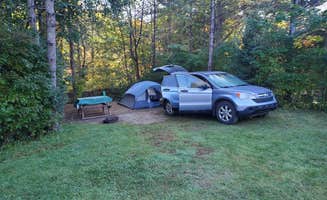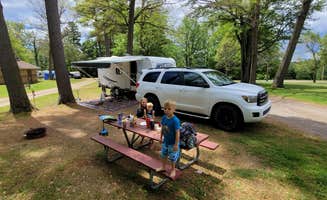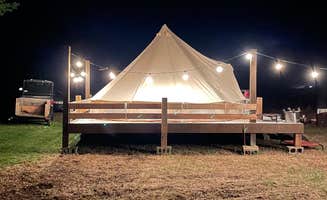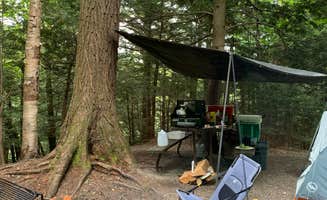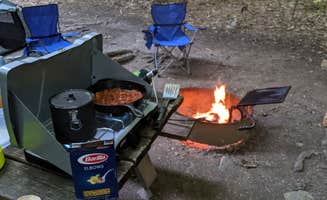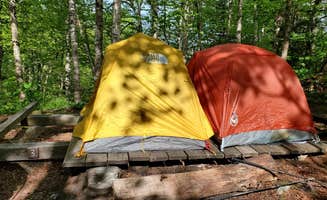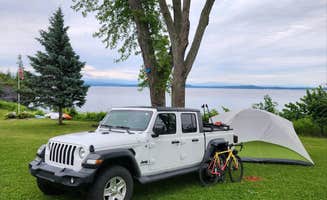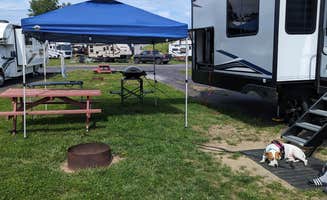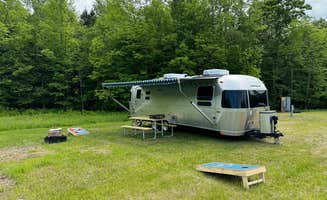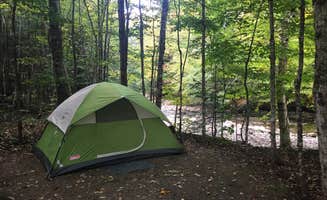Camping in the Williston area offers diverse options from lakefront sites to mountain recreation. Most campgrounds sit between 200-600 feet elevation with typical summer temperatures reaching 75-85°F during peak season. Winter camping is limited to a few year-round facilities, with snow accumulation making access challenging from November through April.
What to do
Hiking trails: Little River State Park Campground features several historical hiking paths with remnants of early settlements. "The hiking trails are really good--they're actually pretty steep. There are lots of old foundations hidden on the trails that are fun to discover," one visitor mentioned. These historic foundation sites date to abandoned 19th-century homesteads.
Kayaking and canoeing: The waters around Williston provide numerous paddling opportunities. "The reservoir is a fun place to explore via kayak and canoe as well as by motorboat," reported a camper at Little River State Park. Multiple campgrounds offer boat-in only campsites for those seeking more remote experiences.
Par-3 golf course: Apple Island Resort maintains a 9-hole par-3 course with putting green on-site. "My husband enjoyed his time at the golf course," noted one reviewer. Greens fees typically run $15-25 for non-resort guests.
Winter access: Some parks offer winter camping for the adventurous. "Free of charge during off season, you just have to call a couple weeks ahead to reserve and make sure you park in the allotted area," explained a winter camper at Smugglers Notch State Park Campground. "Hike/snowshoe in to your site as the gate is closed and the area is not plowed."
What campers like
Sunrise views: Mount Philo offers exceptional morning viewing. "Sites vary in privacy levels, with some campgrounds featuring more closely spaced sites while others provide greater separation between campsites," observed one regular visitor. The eastern-facing bluff sites provide panoramic views across Lake Champlain.
Bicycle access: Several campgrounds connect directly to regional bike trails. "We stay every year for the Vermont City Marathon. It is a convenient bike ride down the bike path to the waterside park. Easy access to all of Burlington by bike," mentioned a regular visitor to North Beach Campground.
Clean facilities: Many campgrounds maintain well-kept bathroom facilities. "The ladies side had a fresh flower arrangement everyday," noted one camper at Shelburne Camping Area. Most campgrounds charge 50 cents for 5-minute hot showers, so keeping quarters on hand is advisable.
Beach proximity: Access to swimming areas varies significantly. "This campground is right on the beach! You get the best of both worlds at this location. Biking into Burlington takes 5-10 minutes and you're also right on the beach of Lake Champlain," reported a North Beach visitor.
What you should know
Site separation: Campground density varies considerably across the region. "The sites are absolutely the biggest I've ever seen. The kids have a soccer field out in front of us to play in," reported a visitor to Lone Pine Campsites. Other facilities place sites much closer together.
Road noise: Some campgrounds near highways experience traffic sounds. "The site is close to the highway which is convenient but it also means you hear the traffic all night," noted one Shelburne camper. Selecting interior sites often reduces noise exposure.
Reservation timing: The limited number of sites at smaller parks requires advance planning. "Only 8 campsites, so try to book early," advised a Mount Philo camper. Most popular lakefront sites are booked 3-6 months in advance for summer weekends.
Off-season considerations: "Stayed at a lean-to site here in March. Free of charge during off season, you just have to call a couple weeks ahead to reserve," noted a winter visitor to Smugglers Notch. Water systems are typically shut down by mid-October until May reopening.
Tips for camping with families
Playground access: Several campgrounds offer play equipment. "The large playground was great, and the small boat launch and beach kept us in the water," commented a family at Little River State Park. Some facilities maintain separate quiet camping loops away from playground areas.
Beach conditions: Lake Champlain beaches vary in quality and safety. "Be careful of zebra muscles, they are all over and can do a number on your feet if you are not careful," warned a visitor to Mallets Bay Campground. Water shoes are recommended for swimmers.
Activity options: Multiple campgrounds schedule family programming. "The nature center with youth programs" was highlighted by visitors to Grand Isle State Park as a standout feature. Ranger-led programs typically run Friday-Sunday during peak season.
Accessibility: Some parks offer ADA-compliant facilities. "We actually stayed in an ADA site. It was REALLY nice. Gravel drive all the way in to a nicely built 3-walled platform with a roof," reported a visitor with mobility considerations.
Tips from RVers
Hookup orientation: Not all parks configure utilities in standard arrangements. "Their hook ups are on the passenger side. You have to pull straight in with the truck and camper. This is because a lot of class A prefer this way," explained an RV camper at Apple Island Resort.
Electrical service: Older electrical systems may cause issues at some facilities. "It showed 25 amp coming out of it," reported one RV owner regarding electrical problems. Newer campgrounds typically offer 50-amp service while older facilities may be limited to 30-amp.
Site length variations: Grand Isle State Park Campground accommodates larger rigs at select sites. "We had a huge campsite that was comfortable for 3 tents and 6 adults," mentioned one visitor. Maximum vehicle lengths range from 20 feet at smaller parks to 45 feet at larger facilities.
Dump station availability: Not all parks provide on-site disposal. "Sanitary dump" facilities are available at approximately half the campgrounds in the region, with others requiring use of commercial dump stations in nearby towns.


